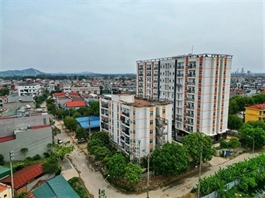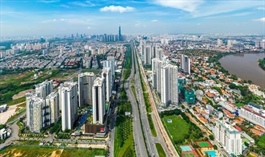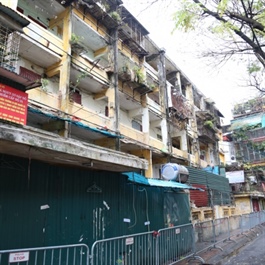Hanoi commercial letting stagnates
Hanoi commercial letting stagnates
Property owners who rent commercial space need to change and adapt their approach in response to the difficulties faced by tenants.
Commercial leasing on Hanoi's streets remains stagnant, according to the Vietnam Association of Realtors. There is little demand for rentals and landlords are not lowering rents or offering small discounts, leaving many premises without tenants.
Vacant commercial premises

A slew of stores have shuttered on Kim Ma Street, Ba Dinh District. Photos: Laodong Newspaper |
On the streets of Hang Ngang, Hang Dao, Hang Bong, Cau Go, Hang Bai, Cua Nam (Hoan Kiem District); Kim Ma, Nguyen Thai Hoc (Ba Dinh District); Chua Boc, Ton Duc Thang (Dong Da District); Nguyen Trai (Thanh Xuan District), rents for commercial properties range from thousands to tens of thousands of US dollars per month.
On Hang Bong shopping street, a shop of about 40 m2 rents for VND30-50 million (US$1,171-US$1,952) per month. On Cua Nam Street, where the shop front and area are smaller, shops of 15-22 m2 rent for VND15-30 million (US$585.8-US$1,171) per month. Many shops in these areas are vacant.
Kim Ma Street - a hub for clothing, toy and fashion accessory shops - has seen a slew of closures.
According to Le Huyen Trang, a property owner on Kim Ma Street, she used to charge VND60 million (US$2,343) per month for a space. However, the tenant returned the commercial space due to poor business performance. Despite putting up a "for rent" sign for more than a month, the landlord has been unable to find a new tenant.
The same situation is playing out on streets that used to be magnets for young consumers looking for fashion, watches, clothes and cosmetics, such as Cau Giay, Xuan Thuy (Cau Giay District), Xa Dan (Dong Da District), where numerous shops have returned their rented premises.
Clothing vendor Nguyen Hung Cuong said he paid VND30 million (US$1,171) monthly to rent a 40m2 store on Cau Giay Street. Sales were slow for about a year or so before the store was open. To afford his expenses, he was forced to rationalize costs, cut staff and increase online sales. Eventually, he had to give up the shop and concentrate on internet sales.
Adaptive measures

Many commercial premises on the streets of Thanh Xuan district have "for rent" signs. |
Vu Ngoc Truong, a commercial letting agent in Hang Gai Ward, Hoan Kiem District, said he had never experienced such difficulties in finding tenants as at present.
He explained that local businesses and tenants are abandoning commercial leases due to high rents while their own businesses are suffering from sluggish sales and reduced consumer demand.
In addition, the rise of digital technology has led to a decline in face-to-face sales of clothing and cosmetics, while demand for online shopping has soared, Truong said. At the same time, many property owners have been reluctant to lower rental prices or have only offered minimal discounts, which is not enough to stimulate demand. As a result, the rental agency business has also seen a decline in revenues.
Nguyen Van Dinh, Chairman of the Vietnam Association of Realtors, said that many rented commercial spaces have recently become vacant as business owners can no longer afford the costs of rent, staff salaries, electricity and water.
Another key reason is that despite the economic difficulties, commercial rents remain high. This has led to a disagreement between property owners and tenants, who ultimately leave the transaction.
Dinh said that demand for commercial leases from major brands and high-end restaurants in prime street-front locations has remained stable.
“In contrast, retail stores that can pivot to online sales have largely withdrawn from brick-and-mortar shops. The abandonment of rented space is quite widespread among shops in small streets and alleyways," he said.
Real estate experts also suggested that as businesses struggle to overcome the challenges, property owners who let commercial space will need to adapt and adjust their approach accordingly.
|
The latest report from global real estate consultancy Jones Lang Lasalle (JLL) shows that Hanoi's retail property market will see supply variations across different areas, with the central area expected to maintain stable supply. In the non-CBD market, approximately 20,000 square meters of new supply will be added in the next six months. This expansion will be mainly driven by completing a project in the West Lake area. In Q2 2024, Hanoi's retail supply will remain at around 671,200 square meters as no new projects have been completed. The supply of core commercial centers in central and non-central areas was 55,000 square meters and 616,200 square meters of leasable area, respectively. The vacancy rate in the central area decreased to 3.7%, a slight 0.2 percentage point drop from the previous quarter, thanks to stable demand amidst limited new supply. In the non-CBD (Central business district) area, the vacancy rate remained at 6.6% during the quarter. In Q2 2024, Hanoi's central and non-CBD areas maintained relatively stable net rents, recording $65.4 per square meter per month and $33.9 per square meter per month, respectively. Hanoi's prime retail market recorded a net absorption of around 120 square meters in 2Q20. While there were some tenant departures, both central and non-CBD areas recorded positive net absorption due to new leasing activities. |




























